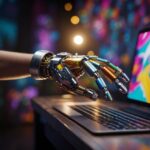Artificial intelligence has woven itself into the fabric of daily life with a subtlety that belies its profound impact. From the recommendation systems that suggest the movies we watch to the digital assistants that live in our smartphones, AI’s presence is both pervasive and indispensable. Its influence spans across industries, streamlining operations, and enhancing customer experiences, making it a cornerstone of modern innovation.

The penetration of AI into our personal routines and global infrastructures promises convenience and efficiency, yet it also raises important questions about privacy, employment, and ethics. As artificial intelligence becomes more sophisticated, its ability to understand and predict human behavior grows, offering unprecedented opportunities for personalization and anticipatory service.
Through continuous advancements, the potential of AI to augment human capabilities is clear. It reshapes markets and social paradigms, compelling individuals and institutions alike to adapt to a world where machine intelligence is a critical component of progress and decision-making.
AI Fundamentals

Artificial Intelligence is a transformative technology redefining a multitude of sectors. This section delves into its definition, historical development, and pivotal concepts.
Defining Artificial Intelligence
Artificial Intelligence (AI) refers to the simulation of human intelligence in machines that are programmed to think and learn. It is the foundational technology that enables machines to perform tasks that typically require human cognition, such as understanding natural language and recognizing patterns.
History and Evolution of AI
The journey of AI began in the mid-20th century, with the pivotal point being the 1956 Dartmouth Conference where the term “Artificial Intelligence” was coined. AI’s progress can be characterized by alternating periods of high expectations and funding—known as “AI summers”—and periods of disappointment and cutbacks—referred to as “AI winters.”
Key Concepts in AI Technology
Machine Learning (ML): A subset of AI, ML allows systems to learn and improve from experience without being explicitly programmed.
Neural Networks: These are algorithms modeled after the human brain, used notably in deep learning, a more sophisticated area of machine learning involving a greater number of layers that permit more complex learning.
Natural Language Processing (NLP): It involves the interaction between computers and humans through natural language, empowering machines to understand and translate speech and text.
AI and Daily Life

Artificial Intelligence (AI) is seamlessly integrating into daily activities, revolutionizing the way individuals interact with technology at home and on the go. From personalizing living spaces to tailoring entertainment experiences, AI’s role is increasingly becoming a fundamental aspect of modern life.
Smart Homes and IoT Devices
Smart homes have transformed everyday living with AI-driven Internet of Things (IoT) devices making homes more comfortable, energy-efficient, and secure. For example, smart thermostats learn a homeowner’s preferences and adjust the temperature accordingly to enhance comfort and reduce bills. Security systems with AI can distinguish between residents and intruders, sending alerts if unusual activity is detected, thereby enhancing home security.
Personal Assistants and Wearables
AI powers a range of personal assistants and wearable technologies, providing personalized support and health monitoring. Devices like smartwatches not only track steps but also monitor heart rates and sleeping patterns, offering insights into users’ health. Virtual assistants on smartphones can schedule appointments, make recommendations, and even help control smart home devices through voice commands, exemplifying convenience and efficiency.
Entertainment and Content Consumption
AI is reshaping entertainment and content consumption, revolutionizing how users discover and enjoy media. Streaming services utilize AI to analyze viewing habits, providing personalized recommendations based on individuals’ preferences. Video games leverage AI to create more realistic and challenging opponents, enhancing the gaming experience. Even news outlets use AI to curate content, catering to the readers’ interests with impressive precision.
AI in Communication

Artificial Intelligence is transforming the ways in which people communicate, from understanding and processing human language to facilitating cross-linguistic interactions. Recognizing nuances and engagement patterns, AI is reshaping the communication landscape.
Natural Language Processing (NLP)
Natural Language Processing is a cornerstone of AI in communication, enabling machines to interpret and generate human language. As described in a publication on Nature.com, AI systems equipped with NLP can understand text and speech, allowing for improved interactions between humans and machines. These advancements lead to AI applications that can perform tasks including summarization, sentiment analysis, and recognize user intent by analyzing large volumes of text data.
Translation and Language Services
AI-driven Translation and Language Services have advanced tremendously, providing near-instantaneous translations across numerous languages. This technology breaks down communication barriers, fostering global collaboration and understanding. Entities such as businesses and travelers heavily rely on AI-powered tools to engage with international partners and local cultures respectively.
Social Media and Networking
In the realm of Social Media and Networking, AI personalizes content, optimizes user experience, and filters information. It identifies trends and user preferences, as mentioned in Harvard Business Review, to curate feeds and recommend connections. AI also plays a critical role in detecting harmful content and maintaining community standards on various platforms.
AI in Commerce

Incorporating artificial intelligence in commerce is revolutionizing how businesses interact with customers, manage their supply chains, and personalize shopping experiences.
E-Commerce Personalization
AI systems analyze customer data and behavior to deliver highly personalized shopping experiences. They can suggest products that customers are more likely to purchase, enhancing engagement and loyalty. For example, algorithms predict preferences based on browsing history and past purchases to generate tailored recommendations.
Customer Service Automation
Customer service is becoming more efficient with AI-powered chatbots and virtual assistants. These tools can handle a large volume of inquiries simultaneously, providing quick and accurate responses. They effectively reduce wait times and improve customer satisfaction by resolving issues or guiding users through the shopping process.
Supply Chain Optimization
Artificial intelligence streamlines supply chain management by predicting demand, optimizing delivery routes, and identifying potential disruptions. Advanced algorithms analyze market trends and historical data to inform inventory decisions, helping companies to minimize overstock and stockouts.
AI at Work

Artificial Intelligence (AI) has permeated the workplace, enhancing efficiency and enabling better decision-making. It plays a pivotal role in automating routine tasks and guiding strategic decisions, demanding a workforce skilled in AI technology.
Automation and Productivity Tools
AI-driven automation tools streamline repetitive tasks, allowing employees to focus on complex and creative work. For instance, RPA (Robotic Process Automation) employs AI to complete high-volume, rule-based tasks quickly and with high accuracy. Similarly, productivity tools like grammar checks and autocomplete, foster a more efficient work environment. Harvard’s insights on everyday AI usage highlight these applications as commonplace, improving the workflow for many professionals.
AI in Decision-Making Processes
At the strategic level, AI is instrumental in decision-making processes. Advanced analytical tools help manage and interpret vast amounts of data to support informed decisions. AI systems can predict market trends, customer behaviors, and even assist with resource allocation—providing a competitive edge to those who integrate AI strategically.
Workforce Skills and AI Education
The evolution of AI demands that the workforce develop new skills pertinent to the changing technology landscape. Companies invest in AI education to upgrade their teams’ skills, promoting adaptability in the digital age. It’s becoming increasingly vital for employees to understand the basics of AI, machine learning, and data analytics to remain relevant and effective in their roles. Forbes discusses the importance of inclusivity and ethical practices in AI, which further encompasses AI education and knowledge-sharing initiatives.
AI in Health and Wellness

Artificial intelligence is revolutionizing the health and wellness industry by enhancing disease detection, powering health monitoring devices, and tailoring medicine to individual genetic profiles.
Disease Detection and Diagnostics
AI systems are increasingly reliable in the early detection of diseases such as cancer. By analyzing medical images like CT and MRI scans, they assist healthcare professionals in identifying malignancies with a high level of accuracy, often surpassing human capability for detail. For instance, AI algorithms are instrumental in combing through vast numbers of medical images, pinpointing signs of diseases such as heart conditions and cancer.
Health Monitoring and Wearables
Wearable technology embedded with AI tracks a wide array of health metrics, from heart rate to sleep patterns. These devices provide real-time data, allowing users to proactively manage their health. The data collected can also alert individuals and healthcare providers to potential health issues before they become serious concerns.
Personalized Medicine
AI contributes to the development of personalized medicine by analyzing a patient’s genetic profile and other individual factors. Such personalized analysis supports the creation of tailored treatment plans that can improve efficacy and minimize side effects. AI’s ability to sift through and interpret complex genetic information accelerates this personalized approach to treatment, making it an integral part of patient care planning.
AI in Mobility and Transportation

Artificial Intelligence (AI) is rapidly transforming the way humans and goods move around the planet. From self-driving cars to smart traffic systems, AI innovations are making transportation safer, more efficient, and more accessible.
Autonomous Vehicles
Autonomous vehicles (AVs), commonly known as self-driving or driverless cars, utilize AI to navigate roads with minimal human intervention. Advanced algorithms process data from sensors and cameras to make real-time decisions on the road. Companies like Tesla and Waymo have made significant strides in this field, with Tesla’s vehicles featuring Autopilot—an advanced driver-assistance system—while Waymo has initiated pilot programs for fully autonomous ride-hailing services.
Traffic Management Systems
AI-powered traffic management systems aim to reduce congestion and enhance safety by analyzing traffic patterns and adjusting signals accordingly. Smart traffic lights and sensors can reduce idling time and optimize the flow of vehicles. In some cities, these technologies have led to a noticeable decrease in traffic delays, proving the efficiency of AI in managing complex urban traffic networks.
Ride-Sharing Services
AI is also integral to ride-sharing services, such as Uber and Lyft, which use sophisticated algorithms to match passengers with drivers, predict demand, and determine optimal routing. These platforms continually learn from vast amounts of data, allowing them to improve user experience and operational efficiency. AI helps in setting dynamic pricing models which can adjust fares in real-time based on current demand, traffic conditions, and other factors.
AI in Security

Artificial Intelligence is revolutionizing the security industry by enhancing surveillance capabilities, improving fraud detection, and bolstering cybersecurity defenses.
Surveillance and Monitoring
AI-powered surveillance systems utilize advanced algorithms to analyze video footage in real-time. They can detect unusual behavior and track movement patterns, significantly reducing the manpower needed for monitoring. For instance, airports and large-scale events benefit from these systems to spot potential threats quickly.
Fraud Detection Systems
Banks and financial institutions employ machine learning to spot fraudulent activities. AI systems analyze transaction patterns and flag anomalies that deviate from a user’s usual behavior, thereby minimizing financial losses. The implementation of AI in fraud detection systems has become a cornerstone in the fight against financial fraud.
Cybersecurity Defense
The use of artificial intelligence in cybersecurity has led to the development of more resilient systems capable of identifying and responding to threats faster than human teams. AI-driven security systems can predict and neutralize potential attacks before they materialize, a discipline discussed in-depth by experts at the World Economic Forum. Moreover, AI’s continual learning process helps maintain a robust defense against evolving cyber threats.
AI in Finance

Artificial intelligence has become a pivotal tool in the financial sector, influencing activities from high-frequency trading to personalized finance advice. AI’s capacity to analyze vast quantities of data and identify patterns has led to more efficient and intelligent financial services.
Algorithmic Trading
Algorithmic trading utilizes AI to make fast, data-driven decisions. AI systems analyze market data at high speeds, recognizing trends and executing trades at volumes and speeds unattainable for human traders. Financial firms employing these systems benefit from increased accuracy and reduced risk of human error.
Credit Scoring and Risk Assessment
In credit scoring, AI algorithms process complex datasets to assess a borrower’s creditworthiness more accurately than traditional models. AI helps lenders in risk assessment by predicting the likelihood of default based on historical data, thus making credit more accessible while managing potential risks.
Personal Finance Management
AI has made significant strides in personal finance management, offering tools that help individuals with budgeting, saving, and investing. Personalized financial advice can be provided through AI-powered apps, helping users to manage their finances more effectively and make informed decisions about their money.
Ethical Considerations of AI

The integration of Artificial Intelligence (AI) into various aspects of life raises important ethical issues that need careful consideration. AI systems not only present opportunities but also pose challenges that could have a profound impact on society.
Bias and Fairness in AI
One critical ethical issue is the potential for AI to perpetuate or even amplify existing biases. AI systems are trained on data that may contain historical or societal biases, and without due diligence, they can generate outputs that are unfair or discriminatory. For example, the use of AI in recruitment has at times shown a tendency towards favoring certain demographics, as highlighted in research discussed by Harvard Gazette. The challenge lies in creating algorithms that are both transparent and equitable to all users.
AI Regulation and Governance
The governance of AI is a complex task that involves not just the creation of ethical guidelines but also the establishment of regulatory frameworks. Global bodies like UNESCO are working towards providing recommendations for the ethical implementation of AI, considering its impact on society. Ensuring that AI is beneficial and aligned with societal values requires international cooperation and legislation that can adapt to the rapid evolution of technology.
Impact on Privacy
AI’s ability to collect, analyze, and store vast amounts of personal data has significant privacy implications. Issues arise when AI systems use this data in ways that individuals may not be aware of or consent to. Addressing these concerns involves creating systems that prioritize individual privacy rights and are designed with consent and data protection at their core. Laws such as the General Data Protection Regulation (GDPR) act as a step forward in protecting individual’s data in the face of increasing AI capabilities.
Frequently Asked Questions

Artificial Intelligence is increasingly shaping the way we interact with technology and making significant impacts across various sectors. This section addresses some of the most common queries about its applications and effects.
What are the most common applications of AI that we encounter in daily life?
Every day, individuals engage with AI applications ranging from personal voice assistants to recommendation systems on streaming platforms. These applications simplify tasks, enhance entertainment options, and personalize user experiences.
In what ways is AI integrated into the tools and technologies used in various industries?
Industries leverage AI for a host of purposes including predictive maintenance in manufacturing, decision support systems in healthcare, and algorithmic trading in finance. These tools enable companies to analyze large datasets and automate complex tasks, translating to greater efficiency.
How is AI influencing decision-making processes in businesses and personal life?
Businesses apply AI to sift through data and provide insights that inform strategic decisions, while on a personal level, AI can assist in everything from scheduling to financial planning. It helps in identifying trends and optimizing choices based on predictive outcomes.
What are some examples of AI technology improving efficiency and productivity in the workplace?
AI applications have been pivotal in automating routine tasks, managing customer relations, and streamlining supply chain operations. They increase productivity by minimizing human error and freeing up time for creative and strategic endeavors.
What are the potential risks and ethical considerations associated with the widespread use of AI?
As AI becomes more ubiquitous, concerns such as data privacy, bias in machine learning algorithms, and job displacement are emerging. Ethical AI practices are essential to mitigate these risks and ensure the technology’s benefits are distributed fairly.
How is AI expected to evolve in the future, and what are the implications for society?
AI technology is anticipated to become more sophisticated, with capabilities that may revolutionize fields like quantum computing and autonomous vehicles. Its evolution will pose new challenges and opportunities, potentially altering societal structures and norms.
- AI in Retail: Transforming Customer Experience and Personalization Effortlessly

- Responsible AI Development: Ethical Adoption and Transparency

- AI and Creativity: The Fusion of Art, Music, and Machine Learning

- AI-Powered Chatbots in Customer Service

- Visa Bets on Web3 Loyalty

- AI is Eating Finance: How Banks are Embracing Large Language Models
